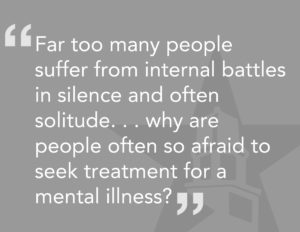From April 16 through 18, Houghton will partner with international organization Take Back the Night to hold several events focused on raising awareness about sexual abuse and related issues.
Over the course of the three days, featured gatherings will include a chapel message from Kristina Lacelle-Peterson, a Take Bake The Night coffeehouse, discussion group, prayer meeting, and a panel about Christianity and sexuality. In addition to testimonies and spoken poetry that will be shared at the coffeehouse, the newest issue of the Lanthorn will debut and feature stories, contemplations, advocacies, and outcries related to this theme.
A group of student leaders, including Carina Martin ’18, Rachel Zimmerman ‘18, Emily Vandenbosch ‘18, and others, have been working diligently to make the event a success. With different skill sets, experiences, and church backgrounds, each student brings a unique perspective to the table.
This year’s theme for Take Back the night is raising awareness for “sexual and emotional abuse when it occurs within the context of the church,” Martin commented. She also noted that it is not intended to be a fund-raising event, but primarily centered on discussion and engagement, as “Everybody has to think about these issues and find ways to deal with this kind of stuff when it happens.” She explained that, “While you yourself might not have been affected by it, your congregation and your church have been affected—almost certainly.”
Zimmerman, editor of the Lanthorn, eagerly anticipated the sharing of poetry, music, and testimonies at the coffeehouse. She commented on her hopes for the evening, highlighting the fact that “poetry and creative writing are some of the most powerful ways to communicate.The power of individual stories and the ability to communicate an emotion—giving someone else access to that emotion—that is really valuable.”
On the meaning of the slogan “Take Back the Night,” Zimmerman elaborated that, “it has a lot to do with what it means to be a woman. The night is symbolic of fear, and this is sort of a way to reclaim the nighttime—reclaim something that everyone should be comfortable in and has been taken from a lot of people and replaced with fear.”
This event has the potential to open the eyes of many who find themself in the dark when it comes to issues related to sexual assault. Vandenbosch described the nature of the event as eye-opening, saying, “Take Back the Night was started to raise awareness of sexual assault and violence on college campuses. This year, we are addressing sex and the church, and both the implicit and explicit messages conveyed about their relationship.” She also mentioned that these events are structured to provide “unique, personal perspectives on how sermons, theologies, resources, and teachings of the Christian church have impacted various individuals’ views of themselves, others, God, sex and sexual assault.”
Take Back The Night highlights issues and shares perspectives that many students have possibly never encountered to help people find a better way to raise discussions about sexual assault and related topics. As Vandenbosch shared, “The purpose of Take Back the Night is to make the Houghton community aware of the underlying issues and causes related to sexual assault, violence and perversion.”
One major emphasis this year is the role of the Church in the context of sex and sexual assault. “People often believe the church is a safe space when it comes to sexual assault, or even sex in general. They believe that is not where the problem lies,” Vandenbosch commented. This year’s leaders are making an effort to address this issue, and expect impactful events and discussions for all who attend.

 While taking the risk that those statements may offend one or many of my readers, I want to stress that the most important issues are often the most controversial. I do not wish to step on the toes of those who support abortion rights. Instead, want to point out that people (especially Christians) who call themselves pro-life and yet enthusiastically support the death penalty or bombing the you-know-what out of our enemies should consider whether they’re really pro-life or just anti-abortion.
While taking the risk that those statements may offend one or many of my readers, I want to stress that the most important issues are often the most controversial. I do not wish to step on the toes of those who support abortion rights. Instead, want to point out that people (especially Christians) who call themselves pro-life and yet enthusiastically support the death penalty or bombing the you-know-what out of our enemies should consider whether they’re really pro-life or just anti-abortion. Far too many people suffer from internal battles in silence and solitude. When someone has a broken bone or an issue with their blood pressure, they see a doctor in a certain specialty and are considered unwise if they do not accept the treatment offered them. Sometimes, that treatment is in the form of physical therapy, medication, or even just the advice that they take time off and rest.
Far too many people suffer from internal battles in silence and solitude. When someone has a broken bone or an issue with their blood pressure, they see a doctor in a certain specialty and are considered unwise if they do not accept the treatment offered them. Sometimes, that treatment is in the form of physical therapy, medication, or even just the advice that they take time off and rest.  For the sake of those whose lives are at stake, don’t be afraid to talk about the things that make you uncomfortable. If you have a friend who battles depression, talk to them about it. You don’t need to pry into the most personal details of their struggle in order to be a loving friend. Telling them that you are a willing ear and that you care for them may provide relief beyond what you could imagine. On the other hand, if you personally struggle with an “invisible” issue, don’t be afraid to confide in a close friend, walk into a counseling office, or speak to a doctor. There is no such thing as an invalid struggle that is unworthy of being addressed. You deserve to show yourself some love.
For the sake of those whose lives are at stake, don’t be afraid to talk about the things that make you uncomfortable. If you have a friend who battles depression, talk to them about it. You don’t need to pry into the most personal details of their struggle in order to be a loving friend. Telling them that you are a willing ear and that you care for them may provide relief beyond what you could imagine. On the other hand, if you personally struggle with an “invisible” issue, don’t be afraid to confide in a close friend, walk into a counseling office, or speak to a doctor. There is no such thing as an invalid struggle that is unworthy of being addressed. You deserve to show yourself some love.